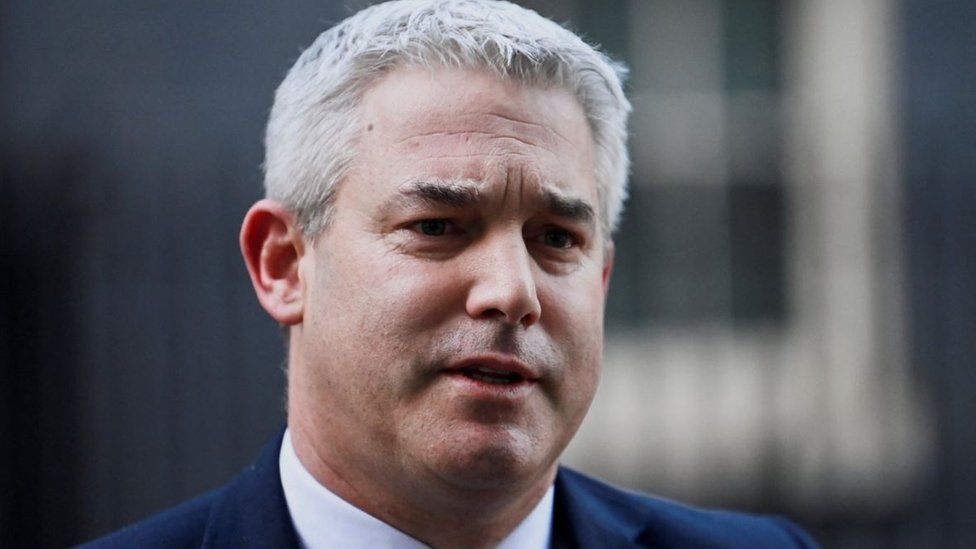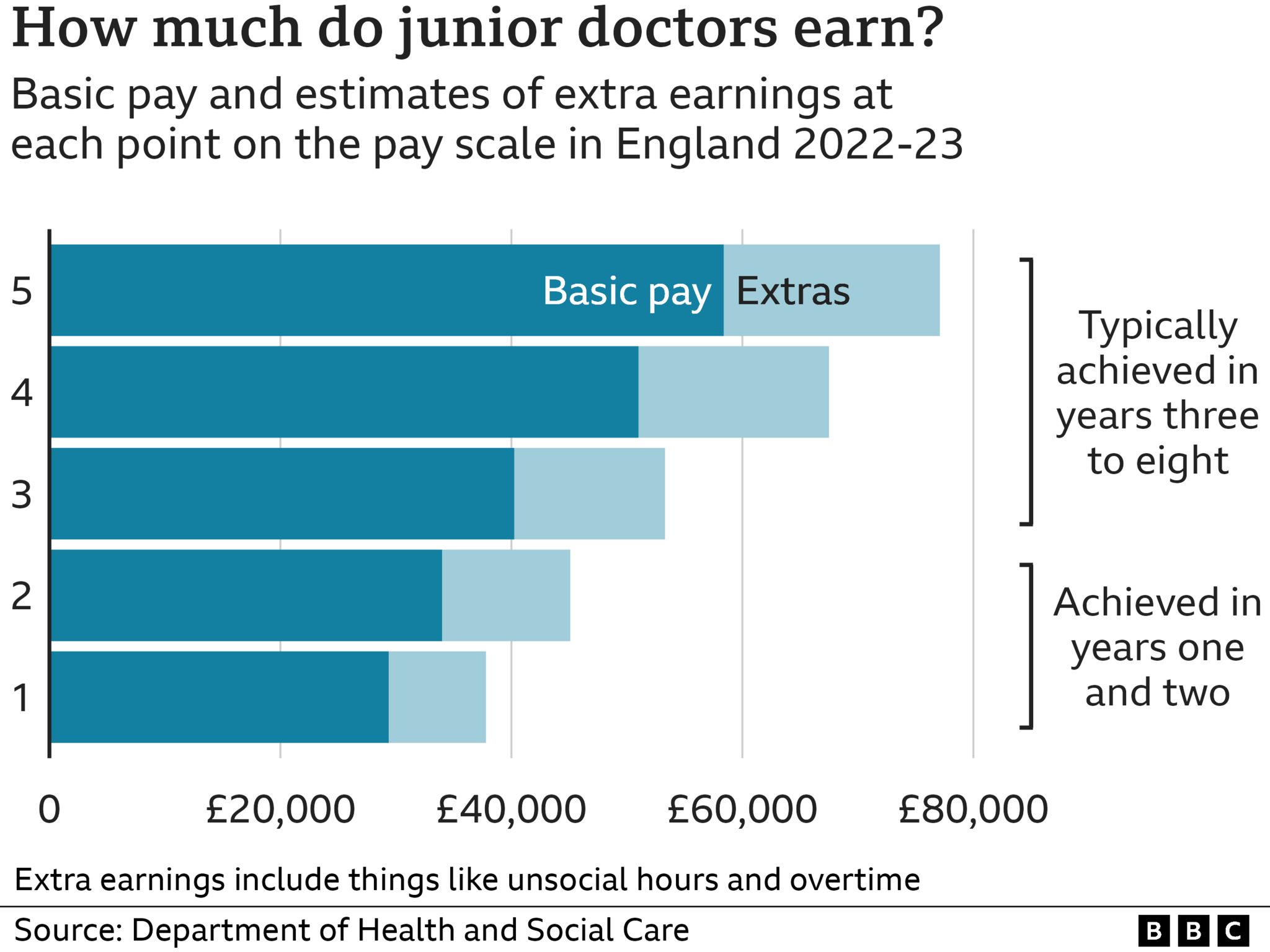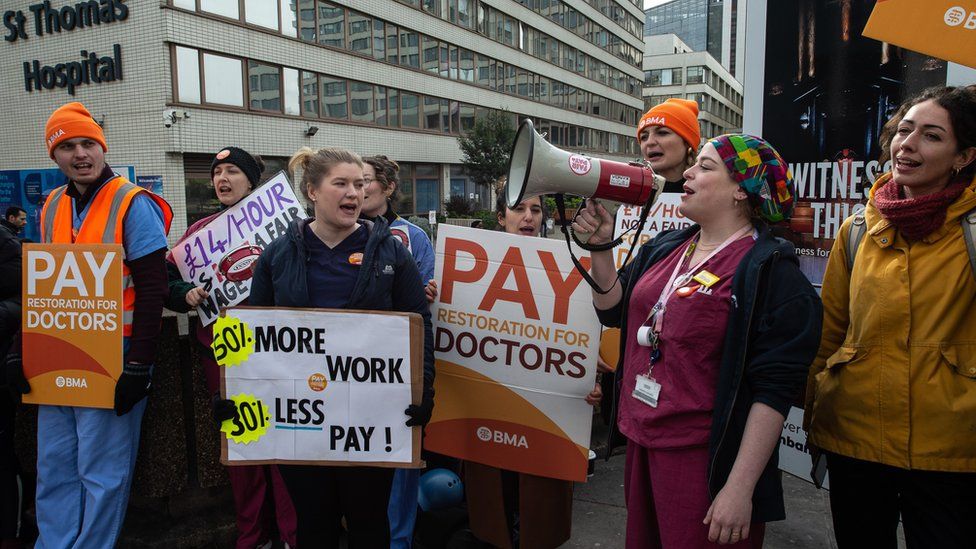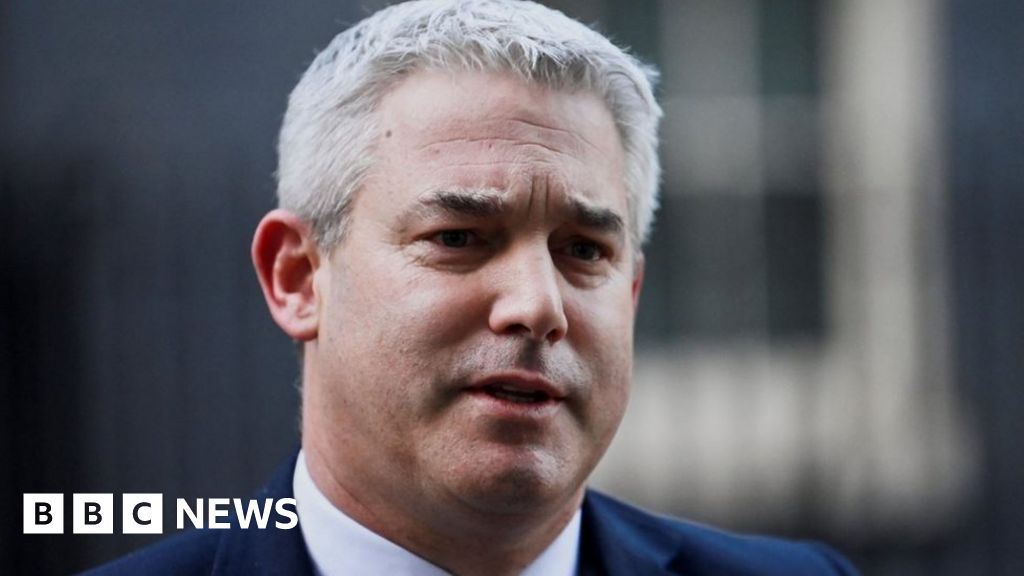
The union representing junior doctors appears “intent on maintaining a militant stance” which “hampers serious talks over pay”, the health secretary has said.
Writing in The Telegraph, Steve Barclay said pay demands by the British Medical Association (BMA) were “unrealistic”.
The union is calling for a 35% pay rise to make up for 15 years of below-inflation wage rises.
Junior doctors in England are set to stage a four-day strike from Tuesday.
The BMA junior doctors committee says real terms pay has fallen by 26.1% when compared to pre-austerity levels of 2008.
Mr Barclay said he could see “no prospect of getting into serious and constructive talks” unless the strike action was cancelled and the BMA changed its pay demands.
Junior doctors are below consultant level, and may have many years experience in a hospital setting or general practice.
Mr Barclay said pay demands by junior doctors were “out of step with pay settlements in other parts of the public sector” and claimed some doctors could receive an extra £20,000 a year if wage demands were met.
The health secretary also said he valued “the important work these doctors do every day” and he wanted “to see a fair deal that increases their pay”.
In his article, Mr Barclay wrote that the four-day strike “threatens to cause significantly more disruption than the previous NHS walkouts we have seen recently”.
“It is deeply disappointing that this industrial action has been timed by the BMA’s junior doctors committee to cause maximum disruption to both patients and other NHS staff,” he said.
“Not only does the 96-hour walkout come straight after the Easter weekend, but it is also longer than previous walkouts. And it coincides with school holidays, Ramadan and Passover.”
He said while contingency plans were being put in place, “significant disruption in the coming days is inevitable”.

Health bosses have estimated that up to a quarter of a million operations and appointments could be postponed as a result of the strike.
In a ballot issued in February, 98% of eligible BMA members backed strike action, on a turnout of 77%
The BMA represents 173,000 members across all parts of the United Kingdom, and saw a recent surge in membership due to more junior doctors joining.
Speaking to the BBC, deputy chair of the BMA junior doctors committee Dr Mike Greenhalgh said falling pay had caused “a real recruitment and retention crisis” in the health service.
Strike action will take place from 07:00 BST on Tuesday, lasting until 07:00 BST on Saturday.
During last month’s strike, hospitals drafted in consultants to provide cover but it is estimated a quarter of them are on leave due to the Easter holidays.
The British Medical Association (BMA) says it will not exempt any services but that there are plans to protect patients, which could involve pulling junior doctors off the picket line if individual hospitals report lives are in immediate danger.
The Department of Health and Social Care has said the government is working with NHS England to put contingency plans in place to protect patient safety during the strike.
“The NHS will prioritise resources to protect emergency treatment, critical care, maternity and neonatal care, and trauma,” a spokesman said.
Ahead of the strikes which begin on Tuesday, Mr Barclay had been urged to meet union representatives over the bank holiday weekend to try to resolve the issue.
Speaking previously, Dr Vivek Trivedi, co-director of the junior doctors’ committee at the BMA, said the union wanted to be sure Mr Barclay “is serious about pay erosion” – but added he is yet to put a credible offer on the table.
“All we’re asking for is a credible offer that shows us he’s serious, that we can start a path of negotiations to try to address the real-terms pay cut,” he said.

Are you a junior doctor with a view on the strike? Are you a patient affected? Share your experiences by emailing haveyoursay@bbc.co.uk.
Please include a contact number if you are willing to speak to a BBC journalist. You can also get in touch in the following ways:
- WhatsApp: +44 7756 165803
- Tweet: @BBC_HaveYourSay
- Upload pictures or video
- Please read our terms & conditions and privacy policy
If you are reading this page and can’t see the form you will need to visit the mobile version of the BBC website to submit your question or comment or you can email us at HaveYourSay@bbc.co.uk. Please include your name, age and location with any submission.
Related Topics
-
-
13 hours ago

-
